
Bucking the #MARCHintosh of time
I bought this Apple PowerBook Duo 230 at a car boot sale, circa 2006. I’d always wanted a laptop, of any description, as a teenager. It was something to aim for, but something I thought I’d never own. A dream present that I never expected but also would never realistically get, for any birthday or any Christmas.
Finding this for £10 brought the dream literally within my grasp. The seller on the car boot stall was very honest, told me about how they’d used it for university assignments, that it was a great laptop, but now it was just surplus to requirements. “Perfect!” I thought, as that’s exactly what I wanted it for, being in uni at the time myself.
However, as a lifelong PC user (still to this day), there were a few hurdles to overcome. I could get data on to it via the keyboard, I suppose, but how do I get it off again? I remember teenage-me rummaging through Maplin and PC World for the right cables, and somehow actually finding an ADB to 9-pin RS232 serial cable. It fitted in the holes either end, but all of my crude attempts to get it to talk to my PC utterly failed.
On a family trip, we called in to see my uncle and auntie near Birmingham, and there I was, in their kitchen, showing off my new laptop, totally oblivious to the fact that they’d bought me one. I was – and can still be – very literal, and I’m sure my uncle asked me if my PowerBook Duo would be everything I’d need, and in a matter of fact way I responded that I couldn’t possibly imagine needing anything else. I’m not sure if my uncle said it aloud, or in body language – “I guess you won’t be wanting this, then?” – but a large leather bag appeared. Inside it was a brand-new HP Pavilion ze4800.
How is this relevant to a blog post about repairing my Mac? Well, it is and it isn’t. In some ways it’s more of an aside. But in terms of feeling sentimental about restoring these old machines, it’s very much part of the same theme, interwoven. Of course, the HP has far more sentimental value to me, as a gift from my uncle and auntie, and I did manage to successfully restore it (there were both bad and good tears). That success spurred me on to see if I could manage it again, with the Mac this time.
Most of my retro computers are scattered about the place, unfortunately. No, I don’t mean they’re literally in bits, but you have the main unit here, the disks there, the power supply somewhere else, proprietary cables buried amongst a mass of cables in one of any number of miscellaneous bags…you get the idea. By sheer luck, though, while looking for my Commodore Amiga A600 (which I still can’t find), I saw my PowerBook looking all forgotten in a corner of the attic, and the power supply also turned up nearby.
So, I plugged it in for old times’ sake. A few seconds went by, uneventfully, with the laptop not powering on, then I lifted the power supply to my ear to hear if it was doing any familiar mains hum, and bang…OK, it was more of a loud pop, but it timed itself perfectly to be right next to my ear, so it felt (and hurt) louder than it was.
My first thought was “well, that’s that, then.” But after the ringing in my ears stopped, I remembered hearing about “reefer caps” – at least that’s how I (mis)heard it – turns out RIFA isn’t a person who mainly goes surfing near coral, but a Swedish capacitor manufacturer, and apparently these capacitors have a habit of being the first point of failure in tech of this age.
When I finally got inside the power supply – which was no mean feat, and involved lots of patient but persistent prising with a screwdriver – sure enough, the RIFA capacitor had blown its top, but luckily without any obvious damage to anything else.
Even more handily, all the broken bits were still legible, and I managed to order a like-for-like new(er) replacement from CPC.
So, all I had to do was unsolder the legs of the old capacitor, and resolder the legs of the new one. Easy, right? No, of course not. Everything is so tightly crammed into this power supply, so just getting the innards out took time and care. And before I could get at the solder on the main circuit board, I had to desolder the ground plate from one of the legs of said capacitor, the earth pin of the IEC C14 (“kettle”) socket, and a grounding terminal on the board.
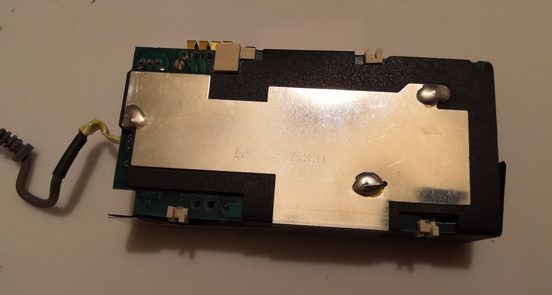
Then I set aside the ground plate, and tried my best to keep the now-brittle-with-age black card intact (that was between the ground plate and the circuit board, and presumably was very necessary for keeping them insulated from each other).

Then I snipped off the old one, and tried to ensure I installed the new one the same way around, even though I was fairly sure that the polarity didn’t matter as it was an AC capacitor. I also absent-mindedly tried and failed several times to solder the middle leg onto the circuit board – failing because there was no pad to solder it to – and then the penny dropped, that the middle leg just passed through the circuit board in order to be directly-soldered to the ground plate.
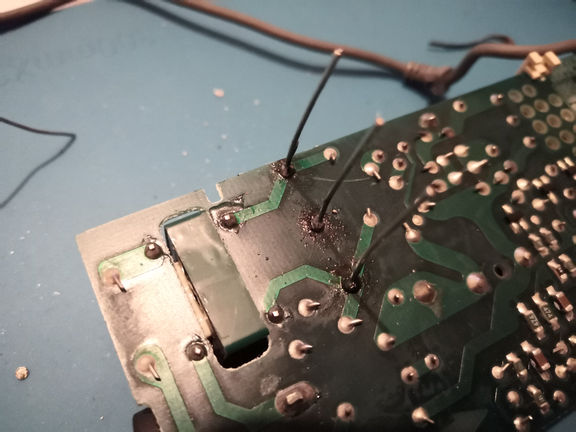
And there we go! As long as we never ever look at the underside again, this looks like a decent repair! A brand new unblown RIFA cap, looking like it’s always been there.
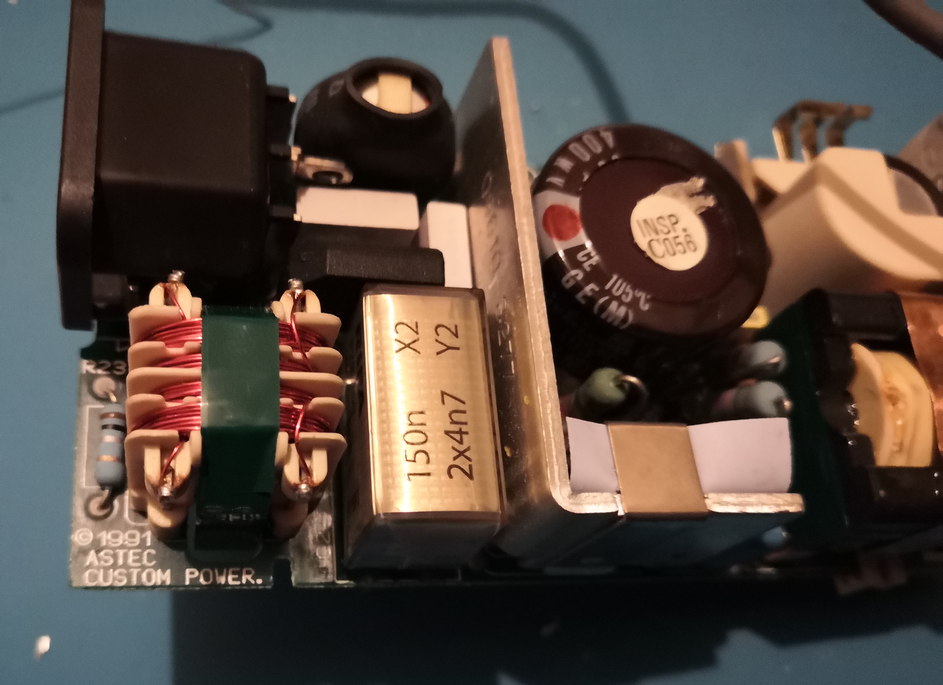
There were a few casualties, however. I couldn’t get all the plastic support bits back in (I still have them in a bag), and I lost one of the four metal fins (I’ve put it back in so that it looks right aesthetically from the outside). But I think all the essential parts remained intact.
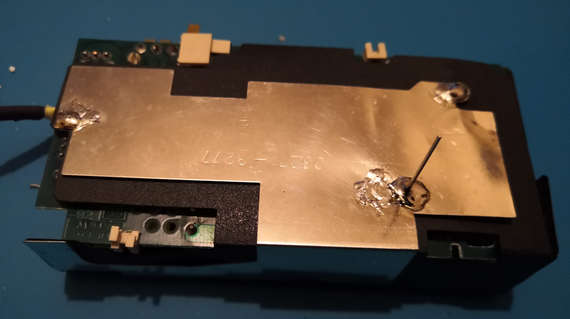
I snipped off the middle leg of the capacitor after soldering the ground plate back on, and then it was just a case of snapping the case back together. But nothing snapped. Nothing clicked. Nothing secured whatsoever. I just had two halves of a case. The little hooks that popped out of the case on hinges to coil the cable around refused to stay put, no matter how tightly I taped the case together. Also, I know I’m a novice, but tape made the whole restoration look so shoddy. But at least it was enough to test that my repair had worked, and it had!
I couldn’t let it end there, though. I might have missed the end of #MARCHintosh 2023 by two months, but after some patient gluing along the seams, and carefully reseating the springs and the hooks, it looked a lot better (apart from my screwdriver-prising marks, but maybe I can gently sand those in time to improve the appearance).
Hopefully this gives you an idea of what you’ll need to do if your Mac PowerBook power supply blows, and even though none of my mistakes were catastrophic, if you can avoid them you’ll have an even better restoration by the end. I’m just chuffed that my 32-year-old Mac is no longer relegated to the attic, and lives to fight another day. The screen on it is still good, and the spinning hard disk also still works without complaint, though I am looking at pre-emptively replacing it with a BlueSCSI eventually.
Blogstacles
Hello blog, it’s been a while! Again!
I can put this down a lot to the fact I was teaching, at least up until just over a year ago. Not only is teaching a job which necessarily takes up a lot of your time and energy, but this blog is a place where I tend to talk about personal, day-to-day experiences and events. When those day-to-day experiences are almost entirely interactions with pupils and lesson planning…well, the former is definitely not appropriate to share on a personal and public blog, and the latter probably wouldn’t be a particularly interesting read either.
As a result, I didn’t really have much left to write about. I hadn’t been going to that many gigs, and I went through a phase of not playing at that many, either. I remember once talking in the staff room about the first night out I’d had in months, and ended up being envied for ‘having a social life’.
In the last year or so, the work situation has been all change, on a number of occasions. My career path is more of a career squiggle, though it’s been a very interesting squiggle. I’m sure I’ll write a blog post about that at some point, as I’m now venturing into pastures new as a software developer. My social life, however, seems to be becoming more stable (there’s a lot more of it, for starters), and as part of that I’m making it to more gigs.
I’m also, ironically, going to blame the march of technology for my lack of blogs – stay with me here – things have advanced so quickly that most tasks requiring dedicated time on a PC can now be done on a mobile phone. For anything lengthy, though, I tend to prefer to get the laptop.
Sure, I can thumb-type ferociously when ideas just have to come out, even if I have to tolerate the speed slowdown from my touch-typing, the corrections that are needed every other word, and the really annoying thing phone keyboards seem to do where the gaps between the keys sometimes seem to let you click on an element behind the keyboard, and all of your hard work vanishes into oblivion (and sometimes you occasionally click on an advert you didn’t want to open, or send a random stranger a friend request in the melee of flying popup windows). Argh! But a proper keyboard is much nicer.
The problem is: getting that proper keyboard means putting down my phone, putting down my coffee, getting up to go to another room, getting my laptop out of my work bag, finding the charger, plugging in the charger, waiting while the laptop boots up and installs updates…
OK, maybe I am being just a teensy bit lazy. But there never used to be a faster way of doing things on the internet. And when you have limited energy and limited free time, the more steps you know are between you and the ‘quick’ thing you wanted to do, the more likely you are to revert to scrolling through Facebook, because there’s only five minutes until Emmerdale is on, anyway, especially if the alternative is furious thumb-typing and the associated build-up of frustration. And so the enthusiasm quickly wanes, the ideas remain in the mind to disappear silently, and creative outlets of the written (or, rather, typed) word go on being neglected.
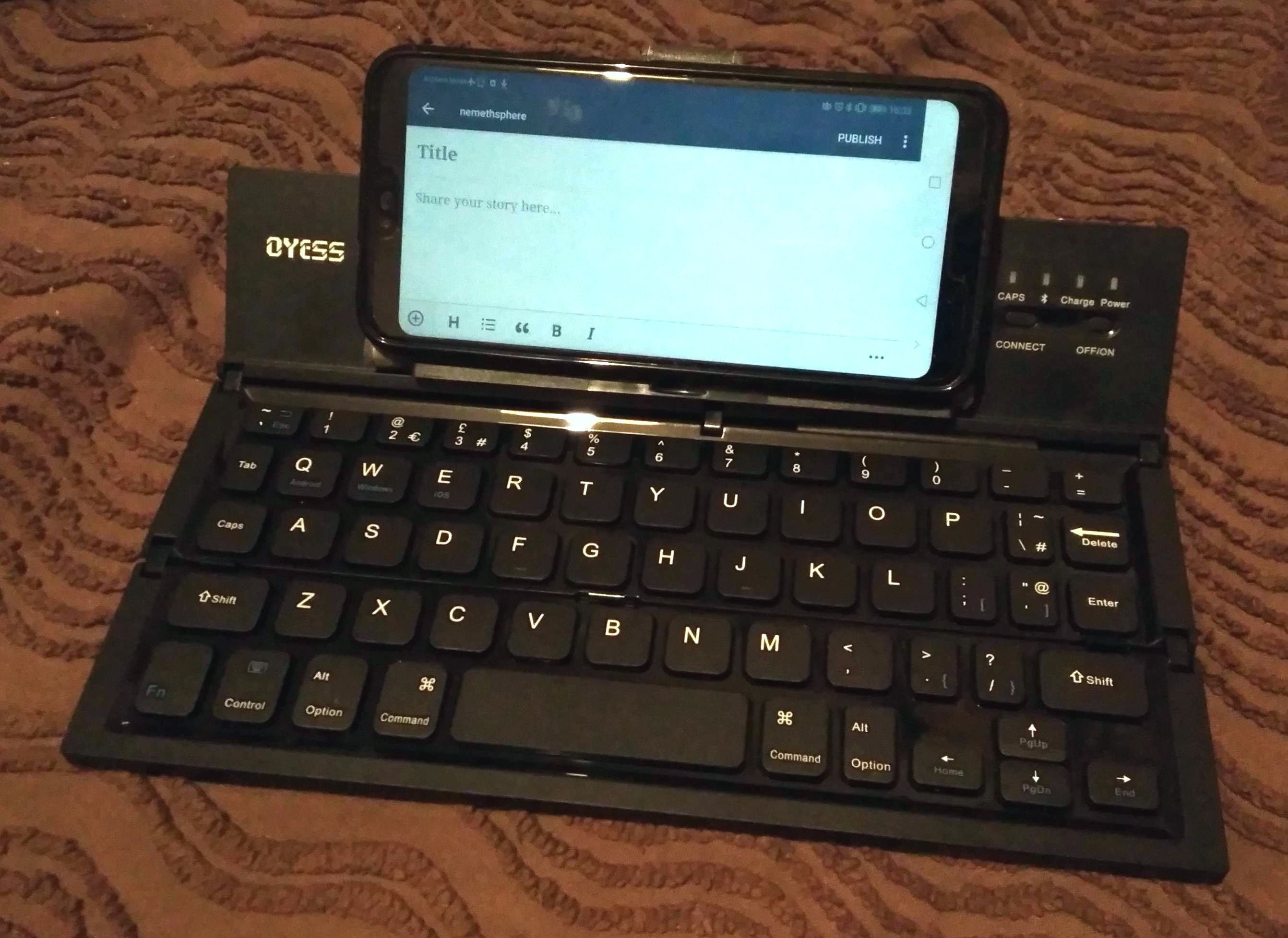
The Oyess folding Bluetooth keyboard, with my phone (in its case) on the built-in stand.
However, mind-numbing and endless scrolling has led to a solution. Potentially. I’m using it right now, to type this, in conjunction with my phone, and the WordPress Android app. It’s a folding Bluetooth keyboard. Nothing particularly revolutionary in that, you say – they have been around for a while – but I’ve never seen one like this before. Most foldable keyboards seem to still be designed to be used on a table. That’s all well and good if you’ve got yourself set up in a nice spot with a table and chair, and maybe a cuppa, but to me that’s not really an advantage over using the laptop. In fact, as implied by the name, you can also use a laptop on your lap, when you don’t have a table. The folding keyboards I’d seen before had the hinges so that the keyboard opened up widthways, which is fine if it’s on a solid surface, but unless it locks rigidly it’s going to fall through my lap, and even if it does lock rigidly, typing will put a lot of strain on those hinges. I can’t see them lasting very long. Also, what do you do with the phone? You could awkwardly stand it up, in a case that lets you do that (mine does), and balance both the keyboard and the phone on your knees, but it’s not a great solution, nor a comfortable one.
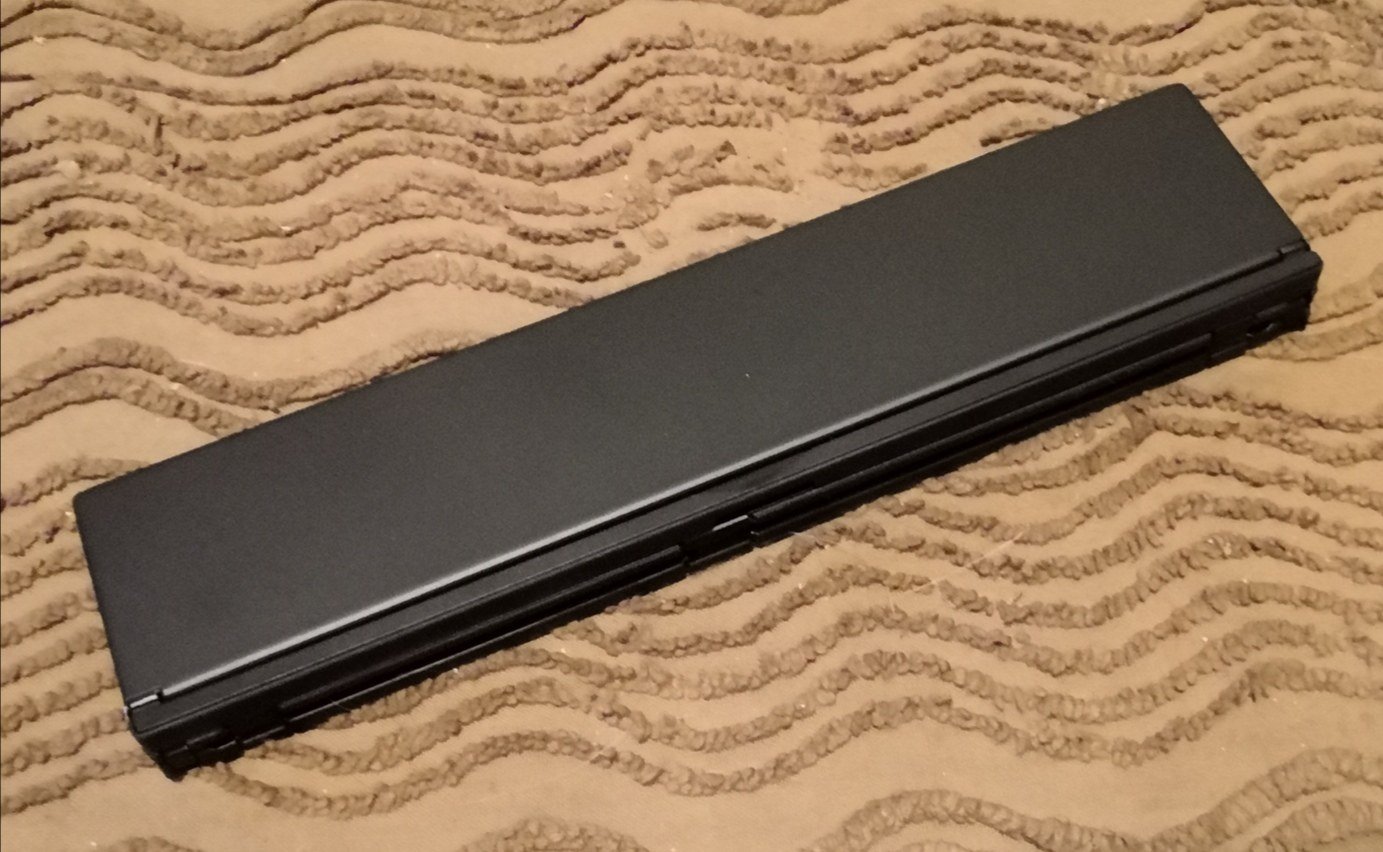
The folded keyboard: magnets hold all of the sections securely closed.
Then I saw a different type of keyboard. One that had the hinges the other way, so that the folded up keyboard looks more like a long, thin necklace box, and the sections of the keyboard can rest across my lap, putting a lot less strain on the hinges as I type. Plus, the back section folds into a stand that locks rigidly. It’s not quite big enough to hold a tablet (at least not my tablet), but it’s perfect for my phone.
It took a while to find this one, though. Scrolling through eBay, I saw many identical-looking adverts, from the same sellers, but they were all different keyboard layouts, so I started to get worried about accidentally ordering a non-UK layout. There are also two categories of negative review, at least in my book. Sometimes, you read a negative review and think “OK, sounds like they’re only human, everyone deserves a second chance”. However, when you see hundreds of negative reviews talking of items not arriving, and refunds not being given, and other shenanigans, that’s more than enough to make me steer clear, even if there are hundreds of positive reviews, too. I was beginning to think I’d never find a different, less-negatively-reviewed seller of this particular type of keyboard, but I did, and one from the UK at that. All I had to do was be willing to settle for a keyboard that was black rather than silver.
There are other advantages to this one, though, over the others: it has a physical on/off switch, rather than automatically turning on when you unfold it. The latter sounds like a great and convenient idea, but if it breaks, you’ll end up with a very expensive brick you can’t switch on any other way. I also like the fact that the lights don’t turn on needlessly – the power switch lights for a short time to show it is turned on, and then doesn’t waste power that should be going towards keeping your keyboard going for as long as possible. The red charging light also turns off to let you know it has fully charged – some of the other keyboards were criticised for not giving any indication of this. It also has a few more keys than the others, and a bit more of a logical layout.
Having written this blog post partly just to write something to test the keyboard, I can say that the chiclet keys are very pleasant to type on – perhaps even nicer than any chiclet laptop keyboards I’ve tried, and definitely easier to type on than my existing laptop keyboard or a desktop keyboard. Also, the other advantage of the hinges running across the keyboard, rather than up, is that the hinges fall between complete rows of keys. On the others, some of the letter keys were made slightly larger or smaller or shifted slightly to accommodate the hinges, and I felt that would mean I’d occasionally be hitting a hinge instead of a key, or hitting the wrong key, or generally getting a strange feeling to typing. I needed virtually no time to get used to this keyboard. It feels like I’ve always used it.
Of course, it only solves the problem when I have a lap to type on. It’s not quite compact enough to always have in my trouser pocket, so thumb-typing will still be the only practical method for most cases when I’m out and about, but for the times I have a bag with me it’ll take up hardly any extra space, and in the house when I get an idea, it’ll be ready to go in seconds.
Now that I’ve removed the technological barrier to my blogging, the only obstacle that remains is my effort. If I can’t surmount that, then maybe I really am just being lazy. Only time will tell, I guess…I’ll either post again in a few weeks, or I’ll be blowing off the cobwebs in another two years…
Resultant force
I always say, but then feel weird saying ‘good luck’ on getting your exam results. It should depend entirely on your hard work throughout the year (or two, or three); no amount of luck on results day, good or bad, is going to change that. Even if the envelope spontaneously combusted, it all goes through automatically online now!
Fourteen years ago, I opened that envelope. I had made firm and insurance choices for university, but as both universities gave me the same offer, I was either getting in to university or not. It certainly made opening that envelope even more stressful than if I had even the remote possibility of a backup plan. They may as well have written ‘yes’ or ‘no’ on a slip of paper in black felt pen and sealed it in there.
It was a ‘yes’, thankfully. But as I’ve learned over the years, if it had been a ‘no’, it wouldn’t necessarily have been the end of the world. It would have been a setback and a major disappointment, with a tangible and natural emotional response. But I’ve had the opportunity to see that there are second chances. I’ve taught people who didn’t get the A-Levels they needed, who have gone on after their foundation year to do really well on the same Physics degree as the rest of us.
If you got the results you wanted, give yourselves a well-deserved pat on the back, and a well-deserved break from the stress over the next couple of weeks. If they’re not what you hoped for, you still need a break, and when you feel ready, regroup, be objective. It’s not as simple as the memes make out: it’s not as simple as believing better things will happen merely by thinking positively. But success is still a possibility. There are also many, many definitions of success.
Objective Retrospective
They say that friends are the family you choose. The fact I’ve chosen to think of my parents as friends shouldn’t be incompatible with this. There are many who tell me how much they admire how close we Nemeths are as a family, and how special this is, but I also encounter people who – I guess the best word I can find to describe it – are troubled by our closeness.
I completely understand that not everyone is close with their relatives, and that in extreme circumstances this can be due to events which no-one should have to go through, making any connection totally untenable. But enduring forced separation, whatever forced it, should make strong connections even more precious, not less.
Even amongst those who aren’t ‘troubled’, there is still a perception that I am somehow hampered by my parents, that I could have achieved so much more without them if I’d flown the nest, or cared less about what they thought, or stopped letting them tell me what to do. At this point, I’m hearing a parody of the recent We Buy Any Car advert in my head: “my parents even let me say all this in a blog!”
To be fair, I haven’t helped myself. I often say “my parents this“, or “my parents that“, without clarifying the deeper meaning behind it. I don’t make the assumption that I have to explicitly state that my parents are more experienced than me, often know better than me (not always, they’re human), that I look up to and respect them, and so if they think this or that, it adds tremendous weight to what I could say on my own, even though I happen to agree with them. Nor do we always agree. Nor do I assume that I have to clarify that we don’t always agree, in order for the full weight of “my parents…” to come across in the way it was intended.
I’ve only just learned to drive. If I said to you “my driving instructor said I must stop at traffic lights”, would you tell me that I shouldn’t listen to their experience? Should I be allowed to make my own mistakes? Am I really going to allow my driving instructor to tell me what to do?
OK, at this point you may argue – quite rightly – that this is not a good analogy. There are rules of the road. There is the Highway Code. There is also common sense. But common sense still has to be learned, and it has been passed down, from generation to generation, whether in print, in traffic law, or in driving lessons. Doing the opposite of common sense, just to be seen to be doing it differently, would be foolish and reckless.
But let’s be more realistic. Parental advice is more like the later lessons. Read the road ahead. Slow down just in case there’s a hazard around that bend. Make sure you can see both ways coming out of a junction, and stop if you can’t. It does sound a lot like being told what to do, but it’s far more subtle. They’ve seen more roads than you have. They’ve seen more of what happens on those roads. There’s no reason why taking their advice necessarily stops you going your own way, but it will help you to do it using experience you haven’t had to gain for yourself. If instead you choose a different route, based on their experience, is this really being told what to do?
When I listen to my parents, I am making a conscious decision, as an adult, to take advice from adults who are wiser than me, care deeply about my future and well-being, share many of the same interests and thought processes, who also happen to be related to me. Some of us find many of these qualities in people who are not related, whether they be friends or partners, yet it’s only parents who apparently exist on a different strata of human being in some people’s eyes. This is unfortunate, and to me, it doesn’t make sense.
Going back to me potentially achieving ‘so much more’ if I’d been ‘more independent’ – let’s be objective. I often wonder what it would have been like to move away to university. I have sometimes allowed myself to be swayed into thinking that I was prevented from doing so by my parents, and it’s all too easy to skew my own memories if I forget to be objective. The reality is that I was impressed by the university I chose right from the day I visited there on a college trip. I’d seen it often from the bus. I’d walked past it, orbited it, and always been curious about it. On open day, it didn’t disappoint. I went to other open days, and some universities came closer than others, but Swansea was still in first place. It just happened to be on the doorstep. Others cited this as the very reason I shouldn’t even be considering it, but if this was the only argument against, it was a pretty poor one. Swansea was a win-win: it was my favourite university, and I lived a minute’s walk from a bus that would get me there reliably each morning (at the time, at least – it’s not quite so convenient now as it used to be, but the declining bus service is a different rant). Maybe I shoulda woulda coulda lived out, but I saved a lot of money by not doing so. I missed out on some of the nightlife, but I also missed out on not getting regular sleep because other students not doing physics weren’t missing out on the nightlife. I missed random fire alarms, and having to move my belongings back and fore each holiday. I didn’t miss my parents. Well, I did miss my parents, but only for a day, not weeks or months.
They get me to work every day, and they get me to gigs. Yes, I could have learned to drive sooner, but with money I didn’t have to spare, which is why I chose not to. Yes, I could have my own car now, seeing as I’ve recently passed my test, but 1) I can’t really afford to buy or maintain one at the moment, 2) where would I put it, 3) isn’t it more environmentally-friendly to car share with the other people I live with, who I just happen to be related to, and happen to share the same musical interests as me? My parents, you say? No, they’re friends I’m bringing to the gig, or rather they’re bringing me to the gig. They really enjoy the music, and promote it loads. It’s a win-win, for me and them. Did they give birth to me? Yes, I suppose so, but they’re actual people and everything.
If you wish to make an apple pie from scratch, you must first create the universe, said Carl Sagan. Yes, I could be more independent. But no-one is truly independent. I could shun the kindness and generosity of these adults I happen to live with, citing the fact that they are my parents, but if this is the only argument against, it is a pretty poor one.
Review: The Broadcasts (new album)
It’s been a little while since I’ve made it to one of The Broadcasts’ gigs myself, after I persuaded my sister to come and see them in 2014 as a ‘birthday treat’ – supposedly for her, as the gig was on her actual birthday, but it was an early birthday treat for me too, and all of the Nemeth family. The gig was at Hobo’s in Bridgend – a venue they returned to in April this year to open the show for hometown band Fire Fences – and we were introduced to two other fantastic bands: the (sadly now disbanded) Remembering August, and the impressive vocals of a very young (at the time) Alex Stacey.
Fast-forward to a few months ago, and The Broadcasts’ social media buzzing with news of a debut album release. It says something about a band when I can buy an album without needing to have listened to any of the tracks, but it must be a level-up to pre-order one. I didn’t even hesitate – I was just perhaps a little shocked that there hadn’t been an album before, but also really pleased that I hadn’t missed the chance to board this ship.
This is an album, in many senses of the word. There’s a Broadcasts-feel woven through it – and frankly it would be odd if this weren’t the case – but the music grows as the band have grown, track by track, as if you are flicking through a child’s photo album. ‘Down The Line’ bounces into life, with not-too-heavy rockiness and luscious harmonies. The second track, ironically, is a little more down-the-line; pleasantly ticking along, with a nice message, catchy structure and attention-grabbing hooks. It is also the track that features on the band’s first lyric video, an art form which does seem to be a sign of ‘The Future’.
We chill out a little before we get to the real surprise – track five – though the track before it gives us an acoustic-guitar-intro hint of what’s to come. ‘The Road Goes On’ deserves the invention of a new genre; I’d call it prog country, but that name was apparently already coined in the 1970s to mean something slightly different: I was going for prog-rock-esque form (partly because it’s nearly seven minutes long), but with a lead-in of middle-of-the-road gentle guitar picking and harmonica, and a lead-out of atmospheric lead guitar and drums, in epic proportions. If Fleetwood Mac’s studio tapes of ‘The Chain’ had been accidentally erased by a freak electromagnetic pulse forty years ago, which also wiped most of the band’s memory of the song and set fire to their paper notes, then they decided to write a song for The Broadcasts that paid tribute to something amazing that never was, this might be how it would turn out.
Despite my alternate-universe ramblings, though, it’s the final track that is the jewel in the crown for me. As I told the band, I was expecting to be taken on a substantial journey by the time I got halfway through. However, I wasn’t expecting to cry. Again, the soulful vocals of the track before it give a slight indication, but nothing – apart from reading this review, perhaps – can prepare you for the emotional effect of the dissonant minor spread-chord of the piano. In some ways, it’s the first thing that stands out as incongruous about the album, but I don’t mean that in a bad way at all: it pulls you out of the state you had settled into, whatever that was, however you got there. You find yourself looking up towards a stage that isn’t there, at least it wasn’t there, but it is now. You hang on every word. You can’t stop yourself. And how aptly titled is this last track – ‘What We’ve Become’ – in our metaphorical photo album, we’ve seen them being born, we’ve smiled as they’ve played as children, and we’ve followed them with bated breath through their teenage years. They are adults now.
The Broadcasts will be launching their debut album at Clwb Ifor Bach on June 17th, with support from Written In Kings and Tom Jenkins.
Mini-review: Bandicoot – Everything I Need
So, what is it about this Bandicoot track that makes it ‘everything I need’? At the time of writing, it’s had 310 listens. At least twenty of those are me (it’s actually becoming a bit of a problem…)
I’ve often said that I enjoy music that makes me feel like I want to conduct it. I don’t mean I wish to change anything, but that everything seems to be placed so carefully, just where I would have wanted it put, as if the orchestration itself is being treated like an instrument played with feeling. That’s what’s happening here. I’d say that’s the X factor…but I don’t want to confuse things with the TV show.
Orchestration isn’t about regularising the life out of something. You can write notes on a page if you like, but it’s not mandatory. The magic happens when you’re all contributing to the same score, to make one that becomes far more than the sum of its parts. It doesn’t have to be on a piece of paper. The way it builds, the way it weaves, the way it layers. If this track isn’t an epitome, it’s pretty bloomin’ close.
There is only one me
Waking up to who you are requires letting go of who you imagine yourself to be. – Alan Watts
It started as a new year’s resolution – my only new year’s resolution – to keep a diary. I threw in the hashtag #ThereIsOnlyOneMe on a whim. It sounds pretty obvious, but so does a lot of advice we give ourselves and soon forget.
Originally, I was only thinking of logistics. There is only one physical me. No-one can be in two places at once. In work, I’m reasonably good at keeping a diary, but teaching does this for you in many ways, as you have fixed times for lessons (I just have to make sure I keep to what’s in the diary!)
The mistake I keep making, however, and the new year’s resolution I’ve often broken, is allowing things to clash outside of work. By keeping a ‘work diary’, in an isolated bubble which only applies to the time I’m in work, I don’t take into account the knock-on effect of working late, or the times where I need to see if I can finish early. I cannot be ‘work me’, ‘musician me’, ‘family me’, etc. in isolation, and keeping them each in their own little time bubbles means that – on rare occasions – they all add up to more than 100%. Gigs clash with work, gigs clash with pre-arranged family time, gigs clash with other gigs…
I’d already been given the solution in 2008 – a small paper diary – but in true Star Trek style, it was so successful a solution that I duly never used it again. In the past, and since, I’ve tried a slew of digital organisers, PDAs, my phone…all of them rely on the user (i.e. me) programming them correctly, and remembering to charge them…
I have tried other paper diaries, but they were too big…so I almost always left them on my desk at work…and so the problem of clashes outside of work continued.
Cue 2016, and a 59p diary, staring at me from the shelves of Poundstretcher. Four inches by three. Pocket-sized. Never runs out of battery, no delay in loading (once the right date has been found), and even if I forget a pen, I’m highly likely to find another before I would have managed to open the calendar app on my phone. This is the future, I thought. And it has worked, to an extent.
I’m realising, though, that the mentality shift of #ThereIsOnlyOneMe is so much bigger than this idea of keeping a diary. When you’re on the stage – whether it’s the stage of a lecture theatre, or any other type of stage, it can be helpful to have a persona. Crucially though, I’m not being false, just ‘Jamie+’: confidence ramped up to 220%, for a fixed and short length of time. Extroverted. Funny (sometimes). I step off the stage, and I’m back to being plain Jame again.
However, somewhere along the way, I got confused: my metaphorical stage and everyday life became flipped. I started simulating a ‘new me’, and he tried to simulate the ‘old me’ (badly), for backwards-compatibility with the real world. This is the thought process behind one of my so-called ponems:
In the past I may have been
Not me; a virtual machine.
Reacting as I thought I should,
Based on how another would.
Simulations of a soul,
Stopping me from being whole.It’s gone on for far too long.
Now I sing a different song,
Rememb’ring who I am, and more:
Friends and family are core.
The past few months and years have been filled with challenges, some of my own making, some beyond my control. I thought I needed to learn who I was, but what I really needed to learn was who I was not. Perhaps it’s more accurate to say re-learn, since almost everything I’ve learned I already knew, annoyingly. In experimental physics, we sometimes need to push against the theories, change theories to match new data, perform experiments in ever more extreme situations to see if the theories hold. But my own mind is not, and should not be a physics experiment. The world is not a simulation. It is filled with real people, with real emotions, real feelings, real lives. And in the past, there’s one person I’d been forgetting to count amongst these real people: me.
I know me better than anyone else. I’ve been me for over thirty years. My family come a very close second – they cannot be me, but they know almost all of me better than anyone else. Anonymous memes, generic magazine articles, even well-meaning advice from friends must be taken along with the context in which it is given. Logic can plot a straight-line course, but the wind and the waves of your psyche will most likely have other ideas. You can’t take the advice of an icebreaker captain and apply it to your canoe (I do love my weird analogies…)
My new year’s resolution to keep a small diary up-to-date has unwittingly become a life-encompassing mantra: whether it’s my schedule, my relationships, my music, my teaching presence, my place in the blogosphere, or anything else…for 2016, and beyond, #ThereIsOnlyOneMe.
No Conflict
If I wear a red poppy, it is not to glorify war, for war can never be glorious.
If I wear a white poppy, it is not to disrespect those who have fought for peace.
If I wear neither poppy, it is not as an act of protest against those who do.
The red poppy remembers the sacrifices made by so many, for so long.
The white poppy symbolises the hope that, one day, such sacrifices will cease.

